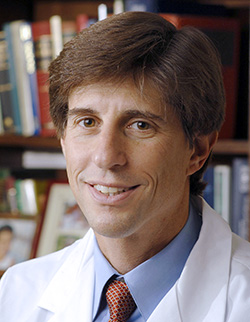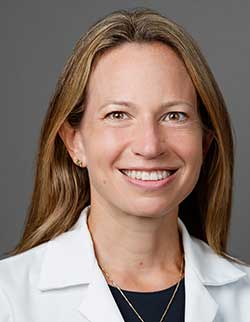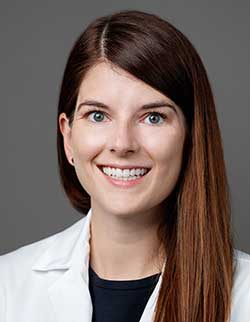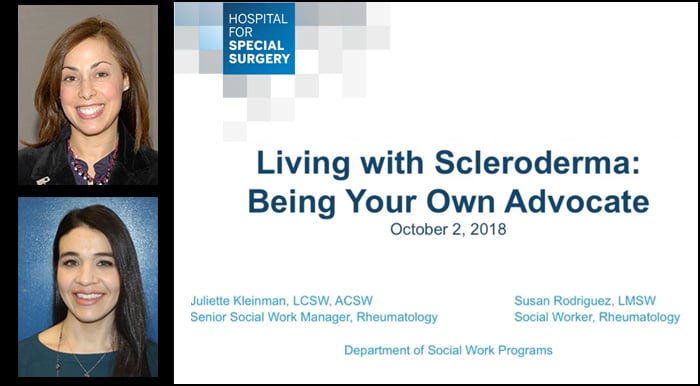Scleroderma, Vasculitis and Myositis Center
Scleroderma, vasculitis and myositis are major areas of investigation and clinical care at HSS. The Scleroderma, Vasculitis and Myositis (SVM) Center of Excellence has been a site for pivotal trials in vasculitis, and with the establishment of the Rudolph Rupert Scleroderma Center, emerged as a leading institution for scleroderma research. Along with an established infrastructure for clinical, translational, and basic research for all three conditions, we also have community outreach programs and patient and physician education.
Increasing Awareness
HSS has been instrumental in bringing attention to scleroderma, vasculitis and myositis. We here at the SVM Center want to further those efforts by highlighting these conditions throughout the year. Please join us as we spread awareness in:
- May as Vasculitis Awareness Month and Myositis Awareness Month
- June as Scleroderma Awareness Month
- September 21 as National Myositis Awareness Day
Scleroderma Fast Track
Recently diagnosed with systemic sclerosis and need a fast appointment?
Our hope is to not only to bring these diseases to light, but to also bring this community of patients together in their fight.
Sign up for our newsletter and learn more about our support groups and patient education.
Scleroderma, Vasculitis and Myositis Center Rheumatologists
Faculty and Staff
SVM Center Dermatologist:
- Horatio F. Wildman, MD
SVM Center Director of Operations:
- Elizabeth Soto-Cardona, MPH
Administrative Assistants:
- Dorcas McRae
Clinical Research Staff:
- Janvi Bhatia BS
- Oshmita Golam, BA
- Liza Morales, MPH
Social Work Staff:
- Mary Carey
Contact Us
For Research Inquiries:
Oshmita Golam, BA – Research Assistant
212.774.7620
Email: golamo@hss.edu
Janvi Bhatia, BS – Research Assistant
212.774.2123
Email: Bhatiaj@hss.edu
Liza Morales, BA-Research Coordinator
TEL 212.774.2561
Email: moralesli@hss.edu
For Physician Inquiries:
Elizabeth Soto-Cardona, MPH
Email: sotoe@hss.edu
Genna Braverman, MD: 332.456.9252
Jessica Gordon, MD: 212.606.1173
Robert Spiera, MD: 212.774.2048
Lindsay Lally, MD: 212.774.2434
Kimberly Showalter, MD: 212.606.1124
David Fernandez, MD: 212.774.7016
For Social Work Services:
Mary Rose Murray Carey, LCSW
Senior Social Work Manager, Rheumatology
212.774.2737
Email: careyma@hss.edu
Baptiste Nicolas LCSW
Senior Social Worker, Rheumatology,
Email: nicolasb@hss.edu
Mailing Address:
Attn: Elizabeth Soto-Cardona
Hospital for Special Surgery
525 East 71 Street
7th Floor
New York, NY 10021
Services and Support Programs
Scleroderma Support
- Scleroderma Support Group: These meetings are sponsored by the Tri-State Chapter of the Scleroderma Foundation and are held online. For more information, please visit sclerodermatristate.org or email NYNY@sclerodermatristate.org.
- Scleroderma Fast Track: If you are recently diagnosed with scleroderma and need a fast appointment with a rheumatologist specializing in systemic sclerosis (SSc) complete this form.
- Scleroderma Buddy Program: This program aims to connect those who struggle with scleroderma, vasculitis or myositis with those who can provide support, which can be particularly helpful for those recently diagnosed. Presently we are only inviting patients seen by HSS physicians to participate in the buddy program. If you wish to participate, please fill out a volunteer consent (to provide support), or if you're looking for support, fill out a support consent form.
- Scleroderma Walk: Members of the SVM Center participate in the "Stepping Out to Cure Scleroderma" events to help raise funds and spread scleroderma awareness. By walking you'll support the Scleroderma Foundation and the hundreds of thousands of adults and children who cope with this disease every day. We encourage you to join us in the efforts by going to https://scleroderma.org/steppingout/ and registering yourself or a team.
Myositis Support and Education Program
Monthly myositis support group meetings sponsored by the Department of Social Work Programs and the Division of Rheumatology at HSS. The group meets virtually (online) on the 2nd Tuesday of every month from 4:00 pm to 6:00 pm. Please contact Suzan Fishbein at fischbeins@hss.edu or 212.774.7623 for meeting information.
Educational Programs
We host a number of educational programs to enhance the public’s awareness of scleroderma, vasculitis and related conditions. View footage of past educational forums hosted by Scleroderma Foundation Tri-State, Inc.
Social Work Services
Social Workers are available to address your and your family's individual needs around a new diagnosis, or any related emotional, social, or practical concerns that can arise. We offer supportive counseling and referrals to community resources through Mary Carey, Senior Social Work Manager, Rheumatology, 212.774.2737 or careyma@hss.edu. For further information, please visit the Department of Social Work Programs website.
Occupational Therapy Services
Occupational therapy provides individualized treatment programs designed to improve dexterity, coordination, mobility and strength of the upper extremities. This specialty focuses on maximizing independence in daily activities to facilitate independence and ensure optimal level of function at home and on the job. The occupational therapists at the HSS Hand Therapy Center provide quality care for patients.
Our occupational therapists are experienced in managing patients with scleroderma, vasculitis, and myositis and are trained to evaluate, assess musculoskeletal function and functional performance. If your hands make it difficult to perform everyday simple tasks such as:
- Brushing your teeth and hair
- Opening a jar
- Pouring a cup of coffee
- Using a knife and fork
- Using a key
- Buttoning or zipping a jacket.
An occupational therapist can recommend new ways of doing things or devices to make tasks easier, and help make you more independent. Occupational therapists can also prescribe specific exercises to help stretch the tissue, and maintain motion. For more information or to set up an appointment, please contact 212.606.1660.
Nutrition
Carol Streep, MS, RD, CDN, LDN
Carol is a Clinical Nutritionist with the Department of Food & Nutrition Services at HSS. She received her Master of Science in Clinical Nutrition from New York University, gaining extensive experience in medical nutrition therapy. Carol works with a broad spectrum of conditions – focusing on a wide array of musculoskeletal conditions and rheumatic diseases, as well as weight management and bone health. Carol believes in a personalized approach to counseling, listening to her patient’s unique needs to create a well-balanced, sustainable nutrition plan.
Department of Spiritual Care
Scleroderma, Vasculitis, and Myositis are serious diseases which can be life threatening and life altering. The impaired quality of life imposed by these diseases as well as the uncertainties they pose for future good health are a hardship for both the patient and their family. Seeking emotional/spiritual support can help with the management of your care.
As members of the health care team, the professional chaplains in the Hospital's Department of Spiritual Care can help improve patient and family outcomes by identifying and addressing important beliefs and values; meeting spiritual needs; and reducing spiritual distress and anxiety for all persons regardless of faith, belief or culture.
Contact the Department of Spiritual Care
535 East 70th Street
New York, NY 10021
9W Room 105
Tel: 212.606.1757
Articles and Education
Living With Scleroderma: Being Your Own Advocate
Watch this video recording of a talk on self-advocacy for people with scleroderma or any chronic condition, presented at the SVM Center. Presenters discuss how to manage your illness, get support, utilize community resources and find a provider you trust.
- What Patients with Scleroderma Should Know About Two Recently Approved Treatments for Scleroderma Lung Disease featuring Kimberly (Showalter) Lakin, MD, MS
- COVID-19 Vaccine and Autoimmune Conditions featuring Robert F. Spiera, MD (view recap email)
- Top 10 Questions for Patients with Scleroderma During Pandemic featuring Jessica K. Gordon, MD
- Ways to Cope with Anxiety and Isolation During the COVID-19 Pandemic featuring Juliette Kleinman, LCSW, ACSW and Susan Rodriguez, LCSW
Scleroderma, Vasculitis and Myositis Articles
Our articles are written or edited by doctors, clinicians and specialists in their field. Review our articles below to learn more about each illness.
Scleroderma Articles
Vasculitis Articles
Scleroderma clinical trials
Vasculitis clinical trials
Myositis clinical trials
Publications
Below are selected publications and research by our center physicians. To see a complete list of their specialties and publications, please see our faculty and staff page.
Articles
2025
Efficacy, Safety, Pharmacokinetics, and Immunogenicity of ABBV-154 in Adults With Glucocorticoid-Dependent Polymyalgia Rheumatica: A Phase 2, Randomized, Double-Blind, Placebo-Controlled Trial.
Arthritis Rheumatol
Spiera RF, Devauchelle-Pensec V, Owen CE, Díaz-González F, Takeuchi T, Drescher E, Anderson J, Arikan D, D'Cunha R, Parmentier J, Kruzikas DT, Zhao W, Yang Y, Stellpflug K, Buttgereit F.
2025
Treatment With Avacopan in Patients With Respiratory Tract Manifestations of Antineutrophil Cytoplasmic Antibody-Associated Vasculitis.
ACR Open Rheumatol
Specks U, Spiera RF, Fussner LA, Lebovics R, Bray S, Gurlin RE, Trimpe D, Jayne DRW, Merkel PA, Merkel PA.
2025
Psychometric Evaluation of the Scleroderma Skin Questionnaire: A Novel Patient-Reported Outcome for Skin Disease in Patients With Systemic Sclerosis.
J Rheumatol
Yu JM, VanBuren JM, Child A, Alvey JS, Mandl LA, Pinheiro LC, Assassi S, Bernstein EJ, Castelino FV, Chung L, Evnin L, Frech TM, Hant FN, Hummers LK, Khanna D, Lakin KS, Lebiedz-Odrobina D, Luo Y, Makol A, Molitor JA, Moore DF, Richardson C, Sandorfi N, Shah AA, Shah A, Shanmugam VK, Skaug B, Steen VD, Volkmann ER, Gordon JK.
2025
Patient perspectives on educational needs in scleroderma-interstitial lung disease.
J Scleroderma Relat Disord
Savvaides TM, Di Vitantonio TA, Edgar A, O'Beirne R, Krishnan JK, Kaner RJ, Podolanczuk AJ, Spiera R, Gordon J, Safford MM, Lakin KS, Aronson KI.
2025
Altered X-chromosome inactivation of the TLR7/8 locus and heterogeneity of pDCs in systemic sclerosis.
J Exp Med
Du Y, Faz-Lopez B, Ah Kioon MD, Cenac C, Pierides M, Lakin KS, Spiera RF, Chaumeil J, Truchetet ME, Gordon JK, Guéry JC, Barrat FJ.
2024
Racial variability in immune responses only partially explains differential systemic sclerosis disease severity.
Ann Rheum Dis
Kuchinad KE, Kim JS, Woods A, Leatherman G, Gutierrez-Alamillo L, Mayes MD, Domsic R, Ramos PS, Silver RM, Varga J, Saketkoo LA, Kafaja S, Shanmugan VK, Gordon J, Chung L, Bernstein EJ, Gourh P, Boin F, Kastner DL, Zeger SL, Casciola-Rosen L, Wigley FM, Shah AA.
2024
2023 American College of Rheumatology (ACR)/American College of Chest Physicians (CHEST) Guideline for the Treatment of Interstitial Lung Disease in People with Systemic Autoimmune Rheumatic Diseases.
Arthritis Rheumatol
Johnson SR, Bernstein EJ, Bolster MB, Chung JH, Danoff SK, George MD, Khanna D, Guyatt G, Mirza RD, Aggarwal R, Allen A Jr, Assassi S, Buckley L, Chami HA, Corwin DS, Dellaripa PF, Domsic RT, Doyle TJ, Falardeau CM, Frech TM, Gibbons FK, Hinchcliff M, Johnson C, Kanne JP, Kim JS, Lim SY, Matson S, McMahan ZH, Merck SJ, Nesbitt K, Scholand MB, Shapiro L, Sharkey CD, Summer R, Varga J, Warrier A, Agarwal SK, Antin-Ozerkis D, Bemiss B, Chowdhary V, Dematte D'Amico JE, Hallowell R, Hinze AM, Injean PA, Jiwrajka N, Joerns EK, Lee JS, Makol A, McDermott GC, Natalini JG, Oldham JM, Saygin D, Lakin KS, Singh N, Solomon JJ, Sparks JA, Turgunbaev M, Vaseer S, Turner A, Uhl S, Ivlev I.
2024
2023 American College of Rheumatology (ACR)/American College of Chest Physicians (CHEST) Guideline for the Treatment of Interstitial Lung Disease in People with Systemic Autoimmune Rheumatic Diseases.
Arthritis Care Res (Hoboken)
Johnson SR, Bernstein EJ, Bolster MB, Chung JH, Danoff SK, George MD, Khanna D, Guyatt G, Mirza RD, Aggarwal R, Allen A Jr, Assassi S, Buckley L, Chami HA, Corwin DS, Dellaripa PF, Domsic RT, Doyle TJ, Falardeau CM, Frech TM, Gibbons FK, Hinchcliff M, Johnson C, Kanne JP, Kim JS, Lim SY, Matson S, McMahan ZH, Merck SJ, Nesbitt K, Scholand MB, Shapiro L, Sharkey CD, Summer R, Varga J, Warrier A, Agarwal SK, Antin-Ozerkis D, Bemiss B, Chowdhary V, Dematte D'Amico JE, Hallowell R, Hinze AM, Injean PA, Jiwrajka N, Joerns EK, Lee JS, Makol A, McDermott GC, Natalini JG, Oldham JM, Saygin D, Lakin KS, Singh N, Solomon JJ, Sparks JA, Turgunbaev M, Vaseer S, Turner A, Uhl S, Ivlev I.
For all publications, please see the PubMed listing.
Book Chapters
- Spiera RF, Kagen LJ. Collagen vascular diseases: Polymyositis, dermatomyositis, and inclusion body myositis. In: Therapy of Systemic Rheumatic Disorders (eds, Furst D, van Riel P, Williams J), Marcell Decker, Inc,. New York, NY, 1998.
- Spiera RF. Systemic Sclerosis and related disorders. In: Manual of Rheumatology and outpatient orthopedic disorders. (eds, Paget S, Gibofsky A, Pellici P), Little Brown and Co., Boston, 2000.
- Spiera RF. Hyperlipoproteinemia and arthritis. In: Primer on the Rheumatic Diseases, 12th edition. (eds, Klippel J, Crawford L, Stone J, Weyand C), Atlanta: Arthritis Foundation, 2001.
- Spiera RF. Polymyalgia Rheumatica, Giant Cell Arteritis and Takayasu’s Arteritis. In: Expert Guide to Rheumatology. (eds, Yee AMF, Paget SA), Am College of Physicians, Phil, PA, 2005.
- Spiera RF, Spiera, H. How Can I Be Sure It Is Really Sjögren’s? The NewSjögren’s Syndrome Handbook, 3rd edition. (ed Wallace DJ), Oxford University Press, Inc., New York, NY, 2005.
- Paget SP, Spiera RF. Polymyalgia Rheumatica and Temporal Arteritis . In: Cecil’s Textbook of Medicine, 23d edition, (eds, Goldman L, Ausiello D), Saunders, an imprint of Elsevier Inc., 2007 (292), 2059-2062.
- Paget SP, Spiera RF. Polymyalgia Rheumatica In: Clinical Care in the Rheumatic Diseases, 3rd edition, (24), 153-157.
- Spiera RF, Paget SP, Polymyalgia Rheumatica and Temporal Arteritis . In: Cecil’s Textbook of Medicine, 24th edition 2010.
- Spiera RF, Spiera, H. Why is Sjögren’s so hard to diagnose? The Sjögren’s book, 4th edition. (ed Wallace DJ), Oxford University Press, Inc., New York, NY, 2011.
- Lally L and Spiera RF. Vasculitis in Pregnancy. In: Contraception and Pregnancy in Patients with Rheumatic Disease. (Ed Sammaritano LR) Springer 2013.
- Spiera RF, Polymyalgia Rheumatica and Temporal Arteritis . In: Cecil’s Textbook of Medicine, 24th edition 2014.
- Forbess LJ, Spiera RF. Raynaud’s Phenomenon. In: Clinical Decision Support: Rheumatology (eds, Cronstein BN, Goodman SM, Kay J and Yazici Y), Decision Support in Medicine, LLC, Wilmington, DE, Forthcoming. 2013.
- Gordon JK, Spiera RF. Systemic Sclerosis, Eosinophillic Fasciitis and Generalized Morphea. In: Clinical Decision Support: Rheumatology (eds, Cronstein BN, Goodman SM, Kay J and Yazici Y), Decision Support in Medicine, LLC, Wilmington, DE, Forthcoming. 2013.
- Bernstein E., Spiera RF, Rheumatoid Vasculitis. (Ed Younger D) Nova Scientific, 2014.
- Lally L, Spiera RF. Pulmonary Vasculitis. Rheum Dis Clin North Am. 2015;41(2)315-.
- Lally L, Spiera RF. Current Landscape of ANCA-Associated Vasculitis: Classification, Diagnosis and Treatment. Rheum Dis Clin North Am. 2015;41(1):1-19.
- Lally L, Spiera RF. Current therapies for ANCA-associated vasculitis. Annu Rev of Med. 2015;66:227-40.
- Spiera RF, Polymyalgia Rheumatica and Temporal Arteritis. In: Cecil’s Textbook of Medicine, 25th edition 2018.
- Bernstein E., Spiera RF, Rheumatoid Arthritis Vasculitis. (2nd Edition) (Ed Younger D) Nova Scientific, 2018.
- Spiera RF, Polymyalgia Rheumatica and Temporal Arteritis. In: Cecil’s Textbook of Medicine, 26th edition 2019.
In the News
- 5 Smart Daily Habits to Improve ANCA-Associated Vasculitis Management
- Why Are My Hands and Feet So Cold?
- Mogil's MobCast with Jessica K. Gordon, MD
- New Research Sheds Light on Why Scleroderma Affects Mostly Women and How to Treat It
- Study Shows Avacopan Effective for Most Serious Vasculitis Cases
- HSS Presents New Research at the ACR Convergence 2024
- Experts Share Early Details Prescribing Avacopan for ANCA-Associated Vasculitis
- Clinical Signs Differ Between Kids and Adults With Vasculitis
- Three new ACR guidelines recommend treatment for six forms of vasculitis
- Vaccine Watch: Protecting immunosuppressed patients
- Lenabasum fails efficacy outcomes in diffuse cutaneous systemic sclerosis, may improve FVC
- Scleroderma Foundation Awards 8 Grants to Advance Research Priorities
- What Is Sjögren’s Syndrome?
- ACR CRISS Score a Reliable Measure of Therapy Effectiveness in dcSSc Patients, Corbus Says
- Ustekinumab for Behçet’s Disease? The Study Results Are In
- Avacopan notches a win in ANCA-associated vasculitis
- What Is Scleroderma? These Are the Signs You Could Have it
- Switching Your Arthritis Medication: 7 Signs It’s Time to Consider It
- Trial Will Test New Treatment for Diffuse Cutaneous Systemic Sclerosis
- Lenabasum Safe and May Be Effective in Diffuse Scleroderma Patients
- New HSS Study Finds Hope in Understanding and Better Treating Scleroderma







